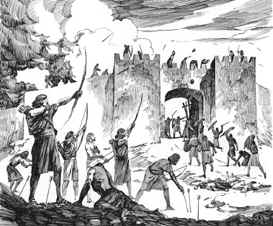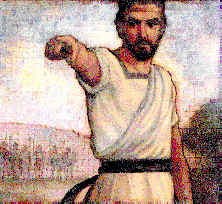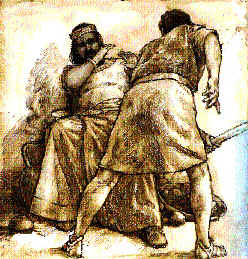The Bible: Judges: The Misery of Sin
Partial conquest: Judges 1
After Joshua’s death, the Israelites asked God, “Who will be the first to go up and fight for us against the Canaanites?” (verse 1). God chose Judah to do battle and promised, “I have given the land into their hands” (verse 2). Judah may have shown a lack of faith by relying on Simeon for additional support (verse 3).
 |
| “The men of Judah attacked Jerusalem also and took it. They put the city to the sword and set it on fire” (Judges 1:8). |
Although Judah conquered several areas in the Negev and western foothills, as well as cities such as Hebron and Debir, their victory was incomplete. Jerusalem, for example, was either not taken completely, or later recaptured by its inhabitants (verses 8, 21). The Jebusite fortress was not taken until the time of David (2 Samuel 5:6-7).
Nor did the other tribes completely drive out the Canaanites. Israel’s failure to destroy this immoral people led to her spiritual decline in the period of the judges.
The covenant broken: Judges 2:1-3:6
The Israelites had broken their covenant with God. This infraction was so serious that God sent an angel to communicate the dire consequences:
I brought you up out of Egypt and led you into the land that I swore to give to your forefathers. I said, ‘I will never break my covenant with you, and you shall not make a covenant with the people of this land, but you shall break down their altars.’ Yet you have disobeyed me. Why have you done this? Now therefore I tell you that I will not drive them out before you; they will be thorns in your sides and their gods will be a snare to you. (Judges 2:1-3)
Israel’s Failures |
|
This event marked a fundamental change in Israel’s relationship with God. God had made a sacred covenant with the Israelites at Mt. Sinai (Exodus 19:5-8; 24:1-8). He had wanted to make Israel a holy nation. For their part, the Israelites were to love God and obey his law (Deuteronomy 6:5; 30:16; Joshua 22:5). They were to follow God’s command not to make any treaties with the peoples of the land (Exodus 34:11-16; Deuteronomy 7:1-5).
Now that Israel had rejected and disobeyed God, his agreement to help them conquer the land was not binding. However, his promise to make Israel a nation through whom the whole world would be blessed would yet be fulfilled in the coming of Jesus Christ, the Messiah.
When the elders who outlived Joshua also died, the people began to turn aside from God. This younger generation of Israelites abandoned the faith of the previous generation and began to worship the deities of the Canaanites (Judges 2:10-15). The major cause of this period of decline in Israel’s history was idolatry — turning away from God to follow false gods.
God forcefully condemns idolatry, as is witnessed by the first two commandments: “You shall have no other gods before me. You shall not make for yourself an idol in the form of anything in heaven above or on the earth beneath or in the waters below. You shall not bow down to them or worship them” (Exodus 20:3-5).
The remainder of this section (Judges 2:10–3:6) describes the organization of the book of Judges as a whole. The people’s behavior followed a ruinous cycle of sin, repentance and sin again. Israel disobeyed God and worshiped the local pagan idols; God punished them at the hands of their idolatrous oppressors; Israel cried out to God for help; God sent a judge to deliver them; Israel obeyed God until the judge died; and, finally, Israel’s old pattern of sin and idolatry reasserted itself, thus starting the cycle again.
As we progress through the book of Judges, we will see that the cycle of sin was a downward spiral. This should serve as a warning for Christians today who may be lulled into the same pattern of spiritual decline.
As we study the book of Judges, we will learn that our immediate environment can affect our relationship with God. The Israelites did not set out to be idolaters. But when they intermarried with the people of the surrounding nations, against God’s command, they began to accept the pagan Canaanite gods and goddesses — and the immoral practices associated with them — into their homes.
Christians living in today’s society face a similar danger. We should not become entangled in the sinful practices of this world. The apostle John warned:
Do not love the world or anything in the world. If anyone loves the world, the love of the Father is not in him. For everything in the world — the cravings of sinful man, the lust of his eyes and the boasting of what he has and does — comes not from the Father but from the world. The world and its desires pass away, but the man who does the will of God lives forever. (1 John 2:15-17)
 |
| “The Spirit of the Lord came upon [Othniel], so that he became Israel’s judge and went to war” (Judges 3:10). |
Episode one: Othniel: Judges 3:7-11
The story opens with the words, “The Israelites did evil in the eyes of the Lord; they forgot the Lord their God and served the Baals and the Asherahs” (verse 7). It may be hard for us to believe that Israel would substitute the worship of the great God for worship of pagan idols of wood and stone. But before we condemn them, we should remind ourselves that we are guilty of the same sin when we put other activities and priorities before our relationship with God. What are your idols? They may not be made of stone, but to God they are just as sinful.
For their idolatry, God delivered Israel into the hands of Cushan-Rishathaim, king of Aram Naharaim (verse 8). Rishathaim is not found anywhere else in ancient literature, but it means “wicked.” The Israelites served Cushan for eight years. They probably paid tribute to this foreign king in exchange for their security.
When the Israelites repented and cried out to God for help, he raised up Othniel to deliver them. Othniel had a rich spiritual heritage. His uncle was Caleb, a man of unwavering faith in God (Numbers 13:30; 14:24). Othniel was also a brave soldier. In Judges 1:12-13, we read that he volunteered to lead an attack against a fortified city. Othniel’s leadership brought the people back to God and freed them from the oppression of Cushan. Unfortunately, it was not long after Othniel’s death that the Israelites fell back into their sinful ways.
Episode two: Ehud: Judges 3:12-30
“Once again the Israelites did evil in the eyes of the Lord” (verse 12). This time, God sent Eglon, king of Moab, against Israel. Allied with the Ammonites and the Amalekites, Eglon defeated Israel.
The nomadic tribes of Moab, Ammon and Amalek lived near one another, southeast of Canaan. These tribes were notorious raiders who possessed great military skill. The Moabites were descendants of Moab, the son of Lot’s elder daughter (Genesis 19:37). They posed a constant threat to Israel. Jephthah, one of the later judges, reminded the Ammonites that they and the Moabites had refused to give Israel permission to travel through their land (Judges 11:14-17). When the Israelites were preparing to enter the Promised Land, they were seduced by the Moabite and Midianite women to participate in idolatrous practices (Numbers 25:1-18).
 |
| “Ehud then approached [Eglon] while he was sitting alone in the upper room of his summer palace and said, ‘I have a message from God for you.’ As the king rose from his seat, Ehud reached with his left hand, drew the sword from his right thigh and plunged it into the king’s belly” (Judges 3:20-21). |
After 18 years of Moabite oppression, God raised up Ehud to deliver the Israelites (Judges 3:14-17). The text here contains three seemingly irrelevant details: Ehud is left-handed, his sword is doubled-edged and 18 inches long, and Eglon is very fat. Since biblical narrative usually does not include many descriptive details, one can assume that these details have relevance in the forthcoming plot. And indeed they do.
Because Ehud was left-handed, he strapped the sword on his right thigh. A movement with his left hand to his right thigh was less likely to be interpreted by Eglon as reaching for a weapon. The sword was short enough to be concealed, yet long enough to do its job. Eglon’s large, cumbersome body made him an easy target for Ehud. After killing Eglon, Ehud led the Israelites to a great victory at Seirah (verses 26-30). Ehud’s courageous faith brought peace to the nation of Israel for two generations.
Articles in “Exploring the Word of God: Historical Books”
|
Episode three: Deborah: Judges 4-5
After Ehud died, the Israelites again sinned against God, who then gave them “into the hands of Jabin, a king of Canaan, who reigned in Hazor” (Judges 4:2). Joshua had defeated an earlier King Jabin, and had burned the city of Hazor to the ground. But the Israelites had failed to expel all the Canaanites from the land, to their later cost. The city of Hazor had been rebuilt by the time of this later Jabin, who oppressed the Israelites for 20 years.
God responded to Israel’s cry for help and used Deborah, a faithful prophetess who was judging Israel at that time, and Barak, a military commander, to deliver the nation. This detailed story is told twice: once in skillfully narrated prose (verses 4-24) and once in a magnificent poem known as The Song of Deborah (Judges 5:1-31). This song resembles another victory hymn, The Song of Moses and Miriam, or The Song of the Sea (Exodus 15:1-18).
Deborah told Barak to raise an army and go to Mt. Tabor, for God would give Israel a great victory over the Canaanites. Barak agreed to do so only if Deborah would accompany him. Deborah agreed, but told Barak that because of his lack of faith in God’s promise of victory, the honor of killing Sisera, who commanded Jabin’s army, would fall not to Barak but to a woman (Judges 4:6-9).
Deborah and Barak summoned the Israelites from Kedesh. Not all the tribes responded (Judges 5:13-18). However, Barak was able to assemble some 10,000 men, chiefly from the tribes of Naphtali and Zebulun. Sisera countered by gathering his troops in the Kishon basin, relying on his 900 iron chariots to overwhelm Barak’s force.
But God decided the battle in Israel’s favor. He demonstrated his superiority over the Canaanite storm god, Baal, by causing an unexpected thunderstorm to transform the Kishon basin into mud, thus immobilizing the Canaanite chariots. Deborah roused Barak to attack, and he routed Sisera’s army. The Israelites would later sing, “The river Kishon swept them away, the age-old river, the river Kishon” (verse 21).
Sisera had managed to escape the initial onslaught of Barak’s army and fled to the tent of Heber the Kenite, a friend of Jabin. Heber’s wife, Jael, welcomed Sisera and gave him some milk to drink. Sisera, believing he was safe, fell sound asleep. Jael then picked up a tent peg in her left hand and a hammer in her right hand, and drove the peg through Sisera’s temple. This act fulfilled Deborah’s prophecy and immortalized Jael in Hebrew poetry (verses 24-27).
Shamgar, referred to in Judges 3:31 and 5:6, fought around this time against another enemy of Israel — the “Sea Peoples,” a group that included the Philistines. The Israelites eventually gained the upper hand over their enemies, and that region of the land had peace for 40 years (Judges 4:23; 5:31).
Deborah |
||
 |
Some have tried to understand God’s selection of Deborah by reasoning that he could not find any man suitable for the job, so he was forced to use Deborah. While this reasoning may serve to keep male egos intact, it ignores the testimony of Scripture. God is able to use whoever he wants. He does not appoint leaders by using human criteria.
When Samuel considered Eliab a suitable successor to King Saul, God corrected Samuel’s limited perception: “Do not consider his appearance or his height, for I have rejected him. The Lord does not look at the things man looks at. Man looks at the outward appearance, but the Lord looks at the heart” (1 Samuel 16:7).
Some have tried to understand God’s selection of Deborah by reasoning that he could not find any man suitable for the job, so he was forced to use Deborah. While this reasoning may serve to keep male egos intact, it ignores the testimony of Scripture. God is able to use whoever he wants. He does not appoint leaders by using human criteria. |
Some find it surprising that God used a woman as a judge of Israel. But we should not allow preconceived ideas or prejudices to get in the way of respecting those whom God appoints to lead us. Barak, a man of faith, loyally followed the individual God chose.
The account in Judges reveals that Deborah’s personality drew people together. She was also a prophetess and led the people to obey God. God used Deborah to influence Israel to remain faithful long after the battle was over. Leaders inspired by God are concerned with the spiritual well-being of those they are called to serve. Deborah certainly was. |
Author: Jim Herst and Tim Finlay

